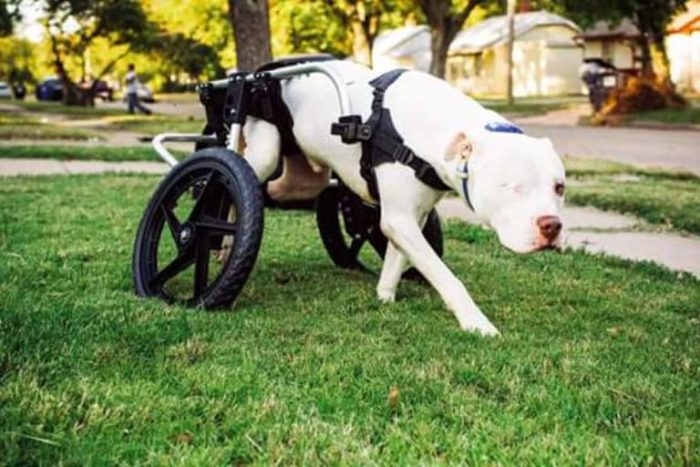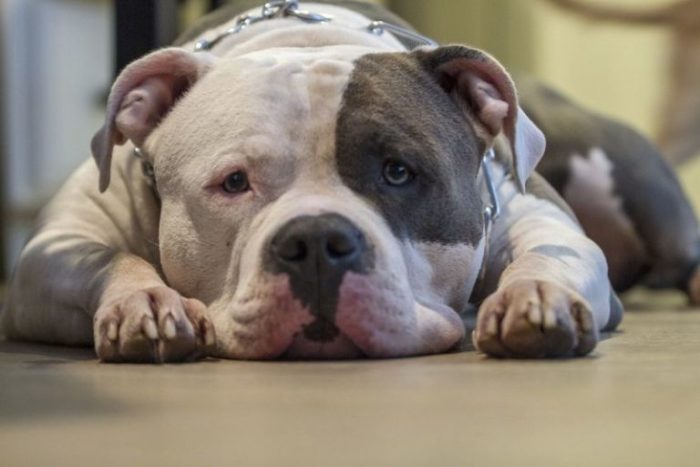The term Pit Bull is a name loosely used to refer to several breeds of canines including the American Staffordshire Terrier, American Bulldog, and of course the Staffordshire Bull Terrier; these are the “Bully Dogs”. Now, how long any of the Pit Bull breeds are expected to live will depend on several factors like lineage, health issues they are susceptible to, maintenance, diet, body weight, and a lot of other factors that come to play in the life of every dog. In fact, there is no definite answer regarding the life span of Pit Bulls but on average, they can survive for 12 to 14 years.
Table of Contents
Truths About The Lifespan of a Pit Bull
On the life span of the Pit Bull breed, it has been proved that they are generally healthy breeds. The American Pit Bull Terriers for one can live for 12 to 14 years on average. However, there is the belief that the Colby bloodline which is considered to be the foundation of the present-day American Pit Bull Terrier breed tends to live longer.
The Colby bloodline is counted among the oldest, as well as the most popular bloodlines in Pit Bulls, dating back over 100 years ago. Even with this belief, experts have proved that there is really not much difference in the lifespan of the Colby bloodline and other types of Pit Bull.
How Old Is The Oldest Pit Bull?
The oldest Pit Bull which is also the current oldest dog in the world is a terrier named max that lives in Louisiana. The male pup is presently waiting to make the Guinness Book Of Records as it turns 26. According to the pet’s parents, they never spoilt Max and only fed him with Kiddles and Bits and a smattering of treats, including beefy doggy bones. No table scraps for Max and it has remained a healthy dog for 26 long years.
Health Challenges – What Usually Kills Pit Bulls?
Genetically, the Pit Bull dog breed is very strong, thanks to its excellent genes, active lifestyle, and athletic build, however, there are health issues to look out for in this bully dog.
1. Skin Problems
Several types of skin diseases have been witnessed in the Pit Bull breed, they can be susceptible to itchy allergies, tumors, but the worst that can happen is skin cancer. Pet parents can help their buddy by;
- Regular grooming and cleaning of ears to keep allergies at bay.
- Your bully dog is prone to sunburn due to their short coat, always provide shade for them.
- Keep a dog-safe bug repellent handy if you live in bugs and mosquitoes-infested compounds. Persistent itching may result in constant scratching that may worsen the situation.
- Any suspicion of skin abnormalities should be reported to your local vet immediately to rule out skin cancer which is the worst-case scenario.
2. Knee Complications

Pit Bulls are highly active and energetic dogs and combined with the breed’s powerful body build, they can be susceptible to injuries at their hind limb, followed by knee problems, as well as ligament tears. The cranial cruciate ligament – a thin tissue on the pup’s knee connecting the thigh bone, can be affected as a result of movement. The constant movement of the breed puts a heavy load on the CCL and any partial tear can develop into a complete tear. Note these;
- A partial tear marks the beginning of a CCL problem which can worsen due to continued movement.
- Torn tissues can be fixed via surgery, if delayed, other health issues can occur.
- CCL on one knee may lead to the impairment of the other knee as it will carry an excess burden because of the weak knee.
- The effect of imbalance can be mitigated with leg support.
3. Hip Dysplasia
Hip dysplasia is a condition that results from an improperly formed hip, constant pain, and may likely lead to arthritis. It comes with these symptoms;
- Lameness in the dog’s hind limbs
- Difficulty in running and climbing stairs
- Limping
- A bunny hopping gait
Hip dysplasia can be corrected with hip surgery, however, there are non-invasive approaches like;
- Canine rehab therapy
- Chiropractic therapy
- Acupuncture
- Hydrotherapy
A hip brace can come in handy for supporting a dog’s hip during exercise to promote activity and relieve pain
4. Allergies
Relative to other canine breeds, Pit Bulls tend to be more susceptible to allergies. Factors that can give rise to allergies include;
- Grass
- Pollen
- Flies
- Ticks
- Food allergies from wheat or grain component
Allergies come with several symptoms including;
- Scratching; can lead to wounds and bleeding
- Drooling
- Licking
- And abnormal shedding of fur
Allergies must be treated immediately to avoid infections on the dog’s skin.
5. Thyroid Disease
Whenever a dog’s body lacks adequate thyroid hormones due to the malfunctioning of the thyroid gland, it tends to add weight, as well as develop skin problems; this is common in the Pit Bull breed. Thyroid disease comes with physical signs and may also result in behavioral changes that tend towards aggression.
Thyroid disease can be diagnosed by your local vet through a blood test and the condition can be counteracted with a lifetime dose of thyroxine.
6. Gastric Dilatation – Volvulus
While gastric dilatation-volvulus is always mistaken for common bloat, the consequences can be fatal and it can happen within a very short time. The condition can give rise to excess gas in the tummy of a Pit Bull after eating. It can be worsened by “air eating’’ or ingesting fermented food. When you notice anxiety and an enlarged tummy in your pooch, a vet should be contacted immediately to decompress the accumulated air.
7. Ichthyosis
Ichthyosis can be an inherited disease in Pit Bulls and it is commonly seen among Terriers. The symptoms to look out for include;
- The outer layer of the dog’s skin thickens
- Thickening in its footpads
- The signs are comparable to human dandruff or fish scales
Delaying treatment will worsen the situation as your pup advances in age.
8. Cataracts
As opposed to other Pit Bull breeds, Staffordshire Terrier is the one that is more susceptible to cataracts and it can either be developed or inherited. Health conditions that can contribute to cataract development include;
- Hypocalcemia
- Diabetes
- Uveitis
Early detection can help your Pit Bull in soothing the condition through pharmaceutical medications.
Surgery is the last resort to get rid of excessive protein build-ups that gives rise to cataract.
There are also Juvenile cataracts that affect Pit Bull puppies below the age of six. The breed is also prone to other eye problems like corneal ulcers.
Read Also: The Bulldog (English Bulldog) Breed Information and Personality Traits
9. Cerebellar Ataxia
Cerebellar Ataxia is totally hereditary, the health condition impacts 1 in 400 Pit Bulls and it comes with these symptoms
- Poor muscle coordination
- Imbalance
- Slower movement as the pup ages
- Uncoordinated movements
- Tremors
- Wobbly gait
- The worst-case scenario is the inability to move
Wheelchairs can be effective in maintaining balance and improving mobility for dogs with this condition.
https://youtu.be/8cWgs7xMMuw
10. Heart Disease
Heart diseases are hereditary and the common heart condition among the Pit Bull breeds is aortic stenosis. Conduct regular checks on your pooch to detect aortic stenosis as it rarely comes with symptoms.
